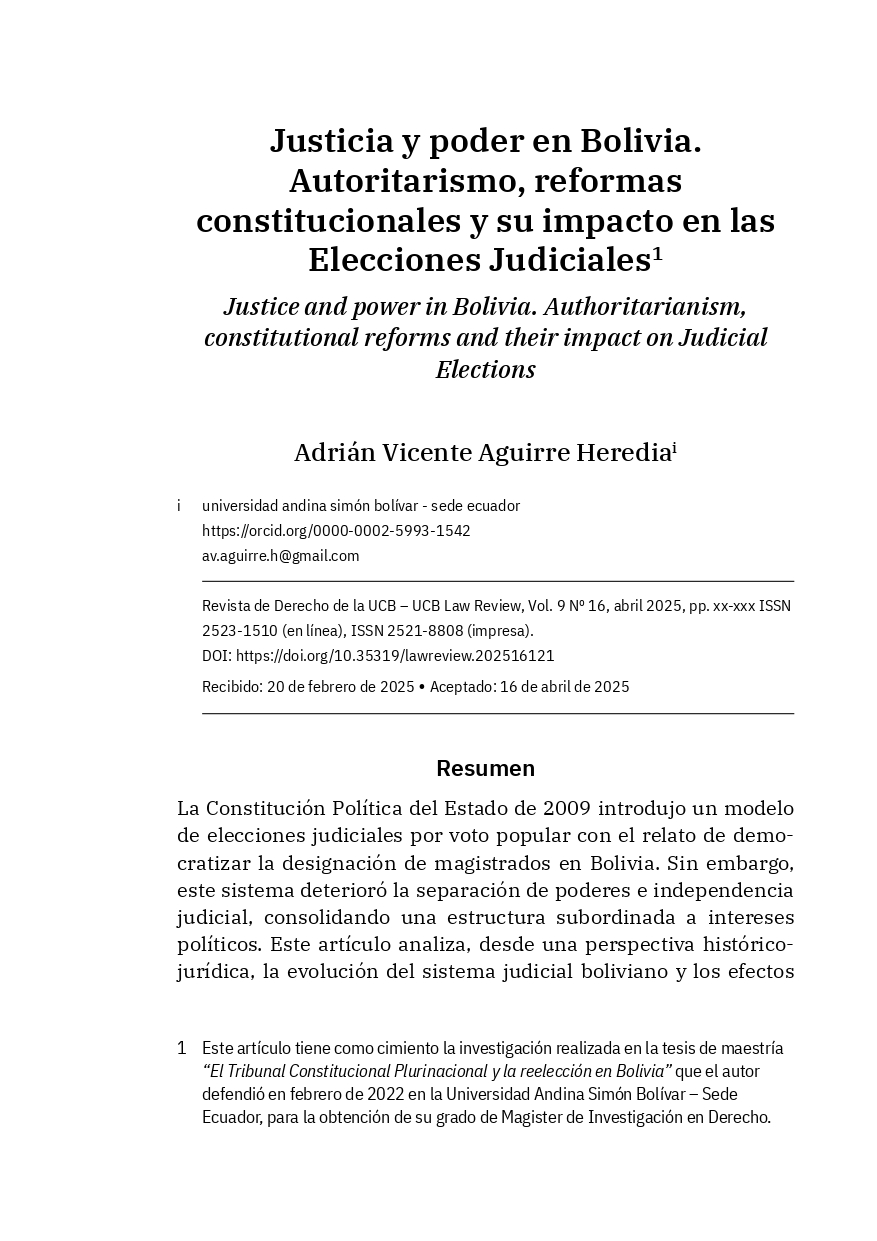Justice and power in Bolivia. Authoritarianism, constitutional reforms and their impact on Judicial Elections
DOI:
https://doi.org/10.35319/lawreview.202516121Keywords:
Judicial independence, Judicial elections, Rule of Law, Constitutional Court, Separation of powers, BoliviaAbstract
The 2009 Political Constitution of the State introduced a model of judicial elections by popular vote under the narrative of democratizing the appointment of magistrates in Bolivia. However, this system has led to a deterioration of the separation of powers and judicial independence, consolidating a structure subordinated to political interests. This article analyzes, from a historical-legal perspective, the evolution of the Bolivian judicial system and the effects of the 2011, 2017, and 2024 judicial elections on the democratic legitimacy of magistrates. The evidence shows that the pre-selection process has turned judicial appointments into a mechanism of political control by the other branches of government. Additionally, this study examines the role of the Plurinational Constitutional Tribunal in the instrumentalization of justiceto facilitate presidential reelection and consolidate an autocratic regime. The article concludes that electing magistrates by popular vote has not strengthened the judiciary but has instead weakened the rule of law and the separation of powers. Finally, it highlights the urgent need for structural reforms to ensure an independent judiciary and an appointment system for magistrates based on merit, transparency, and a proper balance of powers.
Downloads
References
Aguirre Heredia, A. V. (2022). El Tribunal Constitucional Plurinacional y la reelección en Bolivia [Tesis de maestría, Universidad Andina Simón Bolívar – Sede Ecuador].
Alexy, R. (2006). Ponderación, control de constitucionalidad y representación. En M. García Castillo (Ed.), Jueces y ponderación argumentativa (pp. 1-18). Fundación Instituto de Investigaciones Jurídicas/Universidad Nacional Autónoma de México.
Aragón, M. (2002). Constitución, democracia y control. Universidad Nacional Autónoma de México.
Banco Mundial. (2006). Por el bienestar de todos, Bolivia. Banco Mundial.
Brockmann, E. (2009). Perspectivas autoritarias: presidencialismo y déficit republicano. En Plural Editores (Ed.), Contrapuntos al debate constituyente: Ciudadanía y Estado de Derecho (pp. 137-170).
Instituto PRISMA/Editorial Plural Editores. Constitución Política del Estado (1880). Gaceta Oficial, 28 de octubre.
Constitución Política del Estado (1938). Gaceta Oficial, 30 de octubre.
Constitución Política del Estado (1967). Gaceta Oficial, 2 de febrero.
Constitución Política del Estado (1994). Gaceta Oficial, 12 de agosto.
Constitución Política del Estado (2009). Gaceta Oficial, 7 de febrero.
Fundación Konrad Adenauer. (2021). Un amor desenfrenado por la libertad. Tomo I (I. O. Velásquez-Castellanos & L. Cajías de la Vega, Coords.). Plural Editores.
Fundación Konrad Adenauer. (2021). Un amor desenfrenado por la libertad. Tomo II (I. O. Velásquez-Castellanos & L. Cajías de la Vega, Coords.). Plural Editores.
Hassenteufel, O. (2006). La Asamblea Constituyente en Bolivia. Fides et Ratio – Revista de Difusión Cultural y Científica de la Universidad La Salle en Bolivia, (1), 70-80. http://www.scielo.org.bo/scielo.php?script=sci_arttext&pid=S2071081X2006000100011
Lazarte, J. (2005). El recorrido de la Asamblea Constituyente. En Fundemos (Ed.), Opiniones y Análisis: Asamblea Constituyente (pp. 83-110). Fundación Hans Seidel Stiftung/Editorial Garza Azul.
Lazarte, J. (2015). Reforma del “experimento” constitucional en Bolivia. Claves de un nuevo modelo estatal y societal de derecho (para abrir un debate que nunca hubo). Plural Editores.
Lozada, A., & Ricaurte, C. (2015). Manual de argumentación constitucional, propuesta de un método. Centro de Estudios y Difusión del Derecho Constitucional.
Rivera, J. A. (2011). La reelección presidencial en el sistema constitucional boliviano. Revista Boliviana de Derecho, (12), 10-29. http://www.scielo.org.bo/pdf/rbd/n12/n12a02.pdf
Sarmiento, J. P. (2011). Populismo constitucional y reelecciones, vicisitudes institucionales en la experiencia sudamericana. Estudios Constitucionales, (1), 47-49. https://www.redalyc.org/pdf/820/82059136015.pdf
Sartori, G. (2016). Límites de la ingeniería constitucional. Instituto Nacional de Estadística, México, 9-28. https://www.ine.mx/wp-content/uploads/2019/04/CM_09_Sartori.pdf
Seoane de Capra, A. M. (Dir.). (Año). Bolivia, su historia: Gestación y emergencia del nacionalismo 1920-1952 (Vols. 1-6). Plural Editores.
Zegada, M. T. (2007). Reelección, crisis política y democracia. En Plural Editores (Ed.), Contrapuntos al debate constituyente (pp. 157-158). Instituto PRISMA/Editorial Plural Editores.

Downloads
Published
How to Cite
Issue
Section
License
Copyright (c) 2025 UCB Law Review

This work is licensed under a Creative Commons Attribution-NonCommercial-ShareAlike 4.0 International License.
The U.C.B. Law Review is an Open Access Journal, therefore, it is full free for access, reading, search, dowload, distribution and lawfull reuse in any medium only for non-comercial purposes, provided the original work is properly cited.








